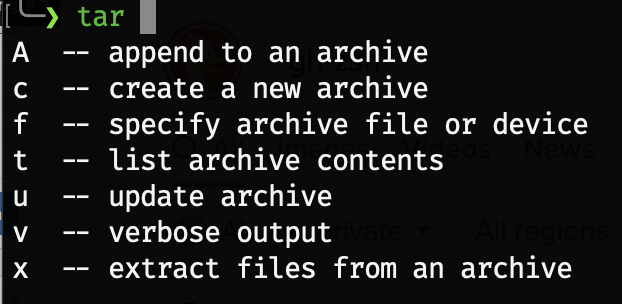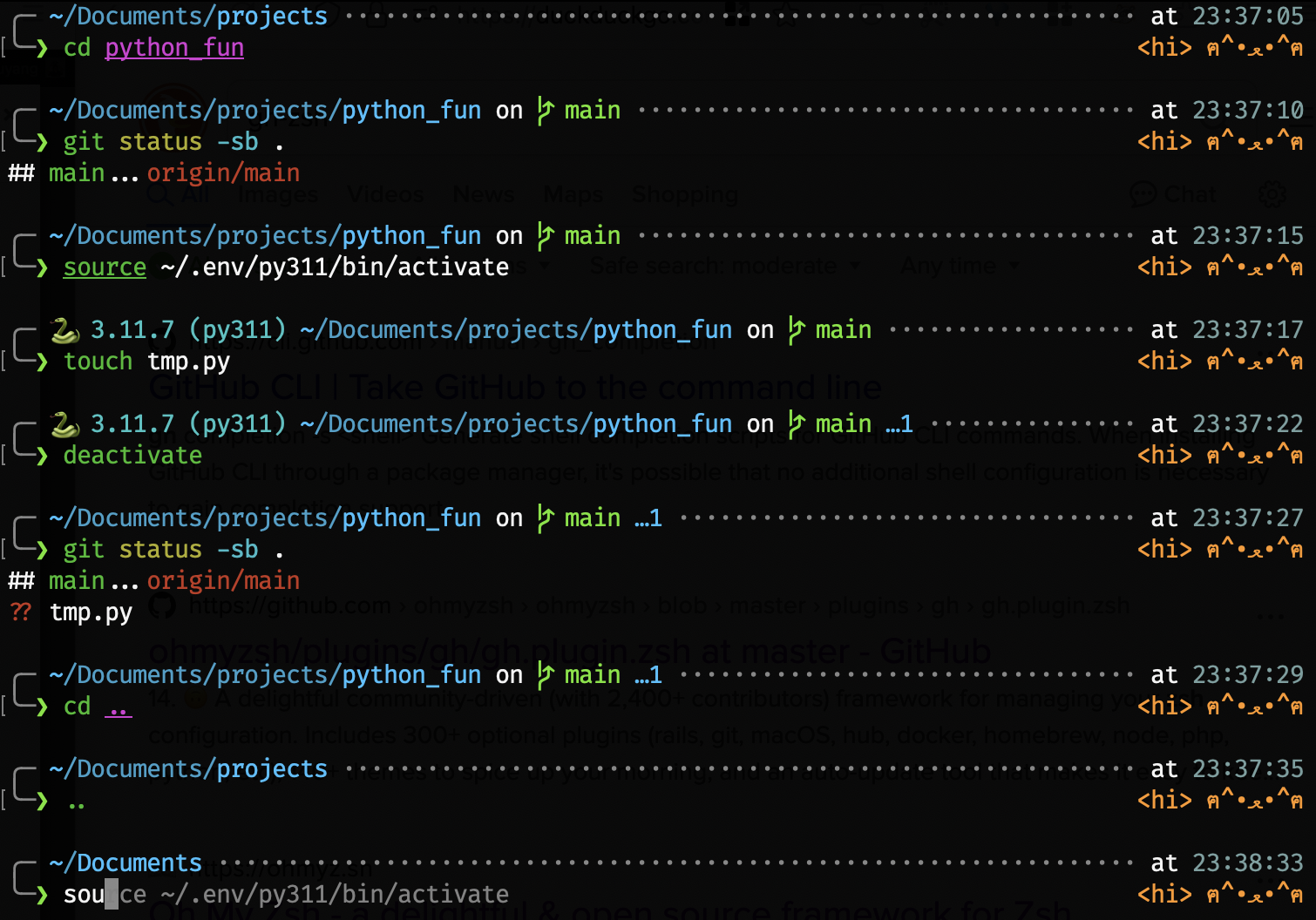sneak preview
blah blah background
mac defaults to zsh, but i resisted changing over right away.
i had a nice dotfiles automation set up (with my terminal timers complete with a custom fun sound when the timer went off). using (someone else’s script) I could clone my dotfiles repo, run a single shell command, and have all my nice terminal customizations.
plus, i had a nice cat.
well, i have not used tt in a while anyway (i really miss working in linux — once i make a bit more, we’re going back to linux haha. though it’s neat the some of the LLMs can run on mac silicon) since it works so-so on my current macbook — mostly, on macbook you can’t force the terminal to stay on top so the timer gets buried anyway.
I also was really happy with autojump. but I had seen brief glimpses of my friends using zsh and it seemed to have really nice tab-completion.
so, zsh time it is!
okay i’m too lazy to write a true write up so i’ll just document what i did for my own reference.
install oh-my-zsh
i’m not sure why oh-my-zsh, but it seems nice. i think it includes a lot of powerful plugins (downloads and lets you one-line activate them).
sh -c "$(curl -fsSL https://raw.githubusercontent.com/ohmyzsh/ohmyzsh/master/tools/install.sh)"
out of the bat — git aliases!
i had that in my bashrc manually, but in oh-my-zsh there’s a one-liner.
alias ga='git add'
and already we can see in ~/.zshrc that we can do
plugins=(git)
and these aliases are included in oh-my-zsh with that one line!
other oh-my-zsh plugins i enabled:
plugins=(git gitignore
magic-enter
colorize
colored-man-pages
python
)
and then let’s overwrite that (rip) — use random stranger’s plugin pack
okay but i was missing my autojump, and i realized that there are still some manual steps to install extra fancy plugins. i didn’t want to do some comprehensive understanding of competion, tab completion, autocompletion of commands vs files vs folders, frequency-based or history, etc. i just wanted someone to pick a few. and all the different themes, wow.
hence then I used
https://github.com/gustavohellwig/gh-zsh
which includes zsh-completions and zsh-autosuggestions which are not in oh-my-zsh. (completions is in oh-my-zsh).
sudo curl -fsSL https://raw.githubusercontent.com/gustavohellwig/gh-zsh/main/gh-zsh.sh | bash
powerlevel10k — no need for other themes
most importantly, it includes a customizable theme called powerlevel10k. This actually walks you through creating a custom prompt in detail — everything from what information you want on the right or left, do you want a timestamp (if so in what format), do you want minimalist or maximalist (with all the icons! and colored backgrounds!), if you want a two line prompt or not, how many colors you want, etc.
it was really cool actually!
p10k configure
after all that I ended up with
╭─ ~/Documents/projects/python_fun on main ········· at 22:48:40
╰─❯
okay but we need cats: editing the p10k prompt
very importantly, i then spent a while figuring out how to add a cat back into my prompt.
thus
vi ~/.p10k.zsh
it turns out an example of adding to the prompt is given in this line, so lets uncomment it
typeset -g POWERLEVEL9K_RIGHT_PROMPT_ELEMENTS=(
[...]
example # example user-defined segment (see prompt_example function below)
way far down we can define it
# Example of a user-defined prompt segment. Function prompt_example will be called on every
# prompt if `example` prompt segment is added to POWERLEVEL9K_LEFT_PROMPT_ELEMENTS or # POWERLEVEL9K_RIGHT_PROMPT_ELEMENTS. It displays an icon and orange text greeting th e user.
#
# Type `p10k help segment` for documentation and a more sophisticated example.
function prompt_example() {
# p10k segment -f 208 -i '⭐' -t 'hello, %n'
p10k segment -f 208 -i '<hi>' -t 'ฅ^•ﻌ•^ฅ'
}
So I put in a cat! hurray! now on the right hand side my cat friend is back 🙂
this is what the cat looks like
╭─ ~/Documents/projects/python_fun on main ········ at 22:58:03
╰─❯ <hi> ฅ^•ﻌ•^ฅ
image:  even when my friends are asleep … terminal cat keeps me company
even when my friends are asleep … terminal cat keeps me company
(the <hi> reminds me of old-school chat logs)
fix the python virtualenvironment display
okay, but what is up with the weird python enviroment display?
╭─ Py py311 ~/Documents/projects/python_fun on main
There’s a random “Py” and the environment name is sort of just thrown in there, grr.
First off, I moved it from the right to the left prompt. It’s the virtualenv not pyenv for reasons i don’t know yet.
typeset -g POWERLEVEL9K_LEFT_PROMPT_ELEMENTS=(
virtualenv
[...]
)
Then I set delimiters around the environment name
typeset -g POWERLEVEL9K_VIRTUALENV_LEFT_DELIMITER='('
typeset -g POWERLEVEL9K_VIRTUALENV_RIGHT_DELIMITER=')'
I also think it’s handy to have the actual python version, so I’ll try it out, but instead of the “Py” which is super random I’ll use a snake instead.
typeset -g POWERLEVEL9K_VIRTUALENV_SHOW_PYTHON_VERSION=true
typeset -g POWERLEVEL9K_VIRTUALENV_VISUAL_IDENTIFIER_EXPANSION='🐍
hurray!
there we have it — a zsh prompt I enjoy 🙂
At first I missed autojump, but after typing a few commands in manually, the completion has been great. Very pleased. will report more later (and I can always install autocomplete).
add oh-my-zsh plugins back
oh right — p10k overwrites your zsh, so we have to add them back in.
╰─❯ vi ~/.zshrc
export ZSH="$HOME/.oh-my-zsh"
[...]
plugins=(git gitignore
magic-enter
colorize
colored-man-pages
python
)
MAGIC_ENTER_GIT_COMMAND='git status -sb .'
MAGIC_ENTER_OTHER_COMMAND='ls -la .'
source $ZSH/oh-my-zsh.sh
explanation of magic-enter plugin config
so basically when you hit enter on an empty line, zsh will automatically put in this command depending on if you’re in or out of a git directory. (either git status or ls -la)
change git icons to be fancier
okay, this is just because I was really confused to have a ?1 in my prompt and i find it funny that the comment mentions exactly this. in ~/.p10k.sh
# Branch icon. Set this parameter to '\UE0A0 ' for the popular Powerline branch icon.
# typeset -g POWERLEVEL9K_VCS_BRANCH_ICON=
typeset -g POWERLEVEL9K_VCS_BRANCH_ICON='\UE0A0 '
# Untracked files icon. It's really a question mark, your font isn't broken.
# Change the value of this parameter to show a different icon.
# typeset -g POWERLEVEL9K_VCS_UNTRACKED_ICON='?'
typeset -g POWERLEVEL9K_VCS_UNTRACKED_ICON='…'
all together now
this is the final result (for now)
note that there is an alias of “..” to “cd ..”, which seems nice. Also, the very last line you c an see how nice the autocompletion is — I only have to type sou and i can tab complete the entire line.
random bugfix: locale
I did change “C” to “en” in the following variables to fix an issue with showing examples for bash commands, where I would get a random text “failed to set default locale”.
here’s what i mean by showing examples, I can just type “tar” and hit tab and get this:
 specifically I changed in my ~/.zshrc:
specifically I changed in my ~/.zshrc:
export LANG="en_US.UTF-8"
export LC_ALL="en_US.UTF-8"
bonus: fancy-looking font: fira-code
someone in my past was very excited about ligatures and fancy fonts for coding. most specifically, this font turns != into what looks more like ≠while you are typing !
brew install font-fira-code
well, i don’t think that worked; in the end i downloaded the zip and unziped and opened the fonts.
then i went into terminal settings and set it to use font-fira 🙂
here are some examples of what it looks like. this is what i actually typed
╰─❯ echo 'Example fira-code ! and = is != , > and = >=, = = == => = and = ==, 0 o O lL1
and it shows up like so here is a video of how the ligatures are rendered on the fly:
here is a video of how the ligatures are rendered on the fly:
all together now
for reference:
.zshrc
export ZSH="$HOME/.oh-my-zsh"
[...]
plugins=(git gitignore
magic-enter
colorize
colored-man-pages
python
)
export LANG="en_US.UTF-8"
export LC_ALL="en_US.UTF-8"
MAGIC_ENTER_GIT_COMMAND='git status -sb .'
MAGIC_ENTER_OTHER_COMMAND='ls -la .'
source $ZSH/oh-my-zsh.sh
and edits to .p10k.zsh
typeset -g POWERLEVEL9K_LEFT_PROMPT_ELEMENTS=(
virtualenv
[...]
)
typeset -g POWERLEVEL9K_RIGHT_PROMPT_ELEMENTS=(
[...]
example
)
function prompt_example() {
p10k segment -f 208 -i '<hi>' -t 'ฅ^•ﻌ•^ฅ'
}
typeset -g POWERLEVEL9K_VIRTUALENV_LEFT_DELIMITER='('
typeset -g POWERLEVEL9K_VIRTUALENV_RIGHT_DELIMITER=')'
typeset -g POWERLEVEL9K_VIRTUALENV_SHOW_PYTHON_VERSION=true
typeset -g POWERLEVEL9K_VIRTUALENV_VISUAL_IDENTIFIER_EXPANSION='🐍
typeset -g POWERLEVEL9K_VCS_BRANCH_ICON='\UE0A0 '
hurray!




